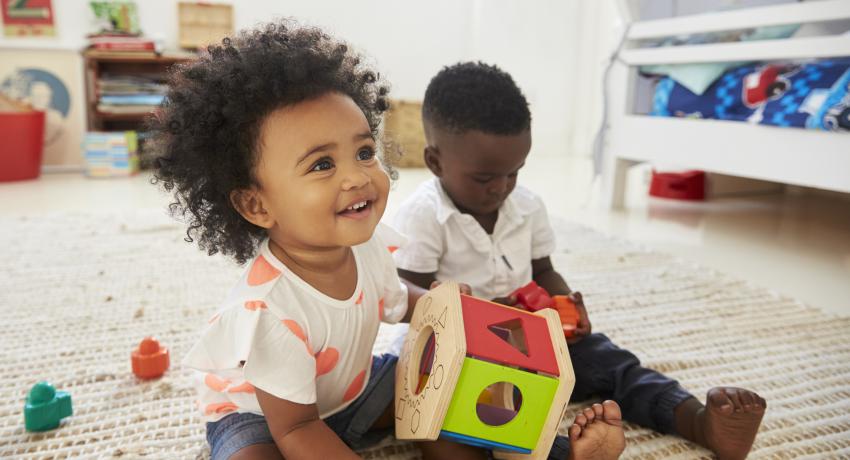The Washington State Department of Children, Youth, and Families (DCYF) is proud to celebrate and honor the diversity of the children, youth, and families we serve. DCYF is also proud of the diverse workforce that support these communities each day through child care and early learning programs.
Black history is made every day, and we all should remember that year-round. To do that, we are lifting up two Early ECEAP programs, both led by powerful Black women in communities that are often marginalized and, in reality, have enormous assets. Bevette Irvis is Senior Director of Childhood Services at Wellspring Family Services and Gail Neal is the Executive Director for the Multicultural Child and Family Hope Center. Each of these programs stays in their strengths, one of which is their staff, with the majority of them reflecting the communities they serve. These staff describe their work colleagues as family, which has resulted in the majority of staff working for these organizations for many years; 10-30 years is not uncommon.
Wellspring Family Services, Seattle
Wellspring has served the Seattle community for almost 130 years, with a strong focus on families and young children who are experiencing homelessness. Wellspring brings an intentional focus on how trauma-informed care works with staff, children, and families.
Wellspring’s approach to serving marginalized children and families starts by building trust with parents. Wellspring works to ensure parents see that their children will be cherished and that staff are a resource for their own dreams and goals.
From meeting families where they are to ensuring children are nurtured in culturally-responsive ways, Wellspring’s efforts are compassionate and stem from the knowledge that all children and families deserve dignity.
Additional services Wellspring provides its children and families:
- Housing services that help locate and maintain housing.
- Baby Boutique: where families can shop (for free) for necessities such as diapers, clothes, and car seats.
- Counseling services.
- Referrals for community services.
- A public health nurse who conducts developmental screenings, immunizations, and health exams.
- A no-expulsion policy.
Multicultural Child and Family Hope Center, Tacoma
The Multicultural Child and Family Hope Center (MCFHC) operates seven days a week in Tacoma, providing culturally-relevant support services to children and families through child care, ECEAP, and other contracted services. MCFHC's mission is to educate, empower, and uplift children, youth communities of color, and highly impacted demographics through relationships that create trust and foster an understanding to increase access to opportunities.
MCFHC has an employee pool that speaks Spanish, Russian, Ukrainian, Vietnamese, and American Sign Language, and are knowledgeable about various tribal cultures.
They provide a safe, nurturing, and relaxed environment with caring adults who enhance self-esteem and encourage independence at each child’s individual pace. They ensure that parents know their children are in a safe, secure place with adults they can trust.
MCFHC provides a number of services and supports for its children, families, and community:
- Music & Art: MCFHC has both a music/movement teacher and an art teacher for Early ECEAP.
- Transitional Housing: Once a year, a Bates Technical College student designs and builds a tiny house to be used as transitional housing for MCFHC clients. If at any time a family shares they are experiencing homelessness, a tiny house can be offered as a safe place to stay until more permanent housing can be found.
- The Recovery House: It’s not just for people in recovery from drug or alcohol addiction, other life challenges are also accommodated. There is room for seven people and it is staffed full time. Many residents are involved in child welfare and are in the process of getting reunified with their children. Parents are supported through the Recovery Café, a support group for parents also run by MCFHC.
- During COVID-19, they collected and distributed $20,000 worth of diapers, wipes, and pull-ups, which benefited nine family support centers in Pierce County.
- COVID-19 TeachBack Sessions: MCFHC hosts sessions with its staff and then its parents in partnership with the Department of Health, where they answer questions about vaccines and discuss myths, how to get vaccines, FMLA, and more.
- Recently, MCFHC held a vaccine clinic for elderly minorities where 200 seniors were vaccinated for COVID-19.
Equity in ECEAP
DCYF ECEAP commits to dismantling racism and building an equitable state-funded preschool system in Washington. Increasing our understanding of and capacity to address the deep-rooted impacts of bias and racism at every level is the highest priority for our team. We embrace equity as a foundation of and driving force behind our work by listening to and learning from families, contractor staff, and communities. Driven by this commitment, we develop and revise systems, policies, and practices, with the goal of eliminating disparities and transforming lives. For more information, visit https://dcyf.wa.gov/services/early-learning-providers/eceap/equity.

